What is the internet?
The internet is a huge global network of interconnected computers and devices that communicate with each other using standardized protocols.
Table of Contents
Internet enables the exchange of data and information through a system of servers, routers, and various transmission technologies. Here are some key aspects of the internet:
Global Network:
The internet connects millions of private, public, academic, business, and government networks worldwide, enabling users to communicate and share information across longer distances.
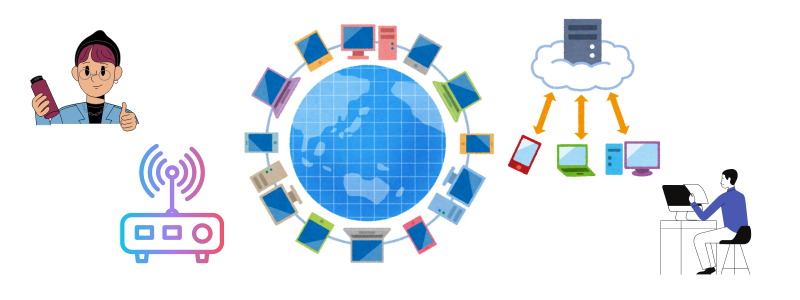
Standardized Protocols:
Communication on the internet is governed by a set of protocols, most importantly the Transmission Control Protocol (TCP) and the Internet Protocol (IP), commonly referred to as TCP/IP. These protocols ensure that data sent from one device can be correctly received and understood by another.
World Wide Web (WWW):
Internet is often referred to as World Wide Web, the World Wide Web is a system of interlinked hypertext documents and multimedia content accessed via the internet. It uses web browsers to access web pages hosted on servers.
Email and Other Services:
Besides the web, the internet supports various other services, including email, file transfer (FTP), online gaming, streaming media, social networking, and instant messaging.
Infrastructure:
The backbone of the internet consists of various kinds of communication infrastructure, including fiber-optic cables, satellites, mobile networks, and data centers.
IP Addresses and DNS:
Each and every device on the internet possesses a unique IP address, which helps in routing data to the correct destination. The Domain Name System (DNS) translates human-readable domain names (like www.example.com) into IP addresses that helps computers to identify each other.
Internet Service Providers (ISPs):
These companies provide individuals and organizations access to the internet. ISPs offer numerous connection types, including dial-up, broadband, fiber-optic, and wireless.
You can check out this router for your internet service with great speed. TP-Link Deco M4 Whole Home Mesh Wi-Fi System, Seamless Roaming and Speedy (AC1200), Work with Amazon Echo/Alexa, Router and Wi-Fi Booster, Parent Control Router, Pack of 3. Here is the link of this product which will help you to see the features and other details :- https://amzn.to/3AqEq2U
Security and Privacy:
The internet also possesses various security measures and protocols to protect data and user privacy, including encryption, firewalls, and secure communication protocols like HTTPS.
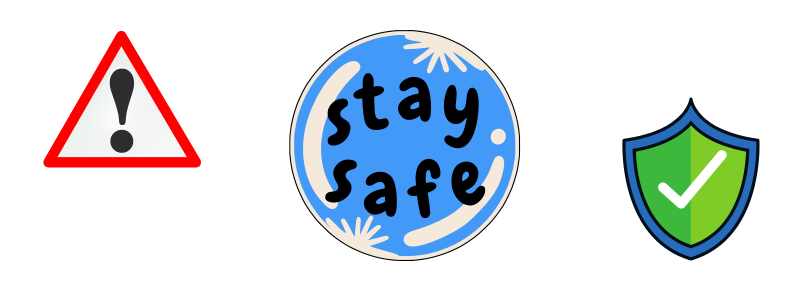
Overall, the internet is a foundational technology of the modern digital age, which facilitates communication, commerce, education, and entertainment on a global scale.
What is the importance of the internet?
The internet has become a necessity in modern society for several reasons. Internet affects nearly every aspect of daily life. Here are some key areas highlighting its importance:
Communication:
Global Connectivity:
The internet enables instant communication across the globe through email, social media, video conferencing, and messaging apps.
Collaboration:
It allows people to collaborate in real-time, regardless of location, which is essential for businesses, education, and personal relationships.
Information Access:
Knowledge Hub:
The internet is a vast encyclopaedia of information, providing access to educational resources, news, research papers, and general knowledge.
Open Access:
It spreads information on a large scale, making it available to a broader audience and bridging knowledge gaps.
Economic Impact:
E-commerce:
The internet facilitates buying and selling goods and services online, expanding market reach and convenience for consumers.
Business Operations:
It supports many business functions such as marketing, customer service, supply chain management, and remote work.
Education and Learning:
Online Education:
The internet supports e-learning platforms, online courses, and virtual classrooms, making education accessible to more and more people.
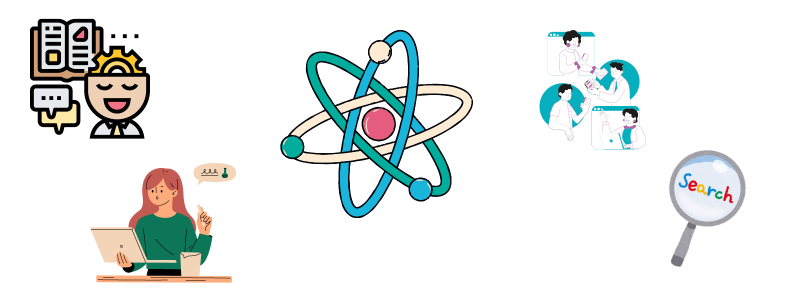
Research:
It provides tools and resources for academic research, enabling easier access to scientific papers, databases, and collaborative projects.
Healthcare:
Telemedicine:
The internet gives access for remote consultations, diagnostics, and monitoring, improving access to healthcare services.
Health Information:
Patients and professionals can access a vast array of health-related information and resources.
Entertainment:
Streaming Services:
The internet provides access to movies, music, games, and other forms of digital entertainment.
Social Interaction:
Social media platforms enable people to share experiences, connect with others, and form communities.
Government and Public Services:
E-Government:
Governments use the internet to provide services such as tax filing, license renewals, and public information which is easily done online with ease.
Transparency:
It increases transparency and accountability by allowing citizens to access government data and services by themselves.
Innovation and Development:
Technological Advancement:
The internet leads to innovation by enabling new technologies, platforms, and applications.
Economic Development:
It plays a vital role in economic growth by creating new job opportunities and business models.
Social Impact:
Awareness and Advocacy:
The internet is a very powerful tool for raising awareness about social issues and mobilizing support for causes.

Cultural Exchange:
Internet facilitates the exchange of cultural ideas and values, promoting understanding and diversity.
Convenience:
Everyday Tasks:
The internet simplifies daily tasks such as banking, shopping, and booking travel, enhancing convenience and efficiency for people of all ages.
Overall, the importance of internet lies in its ability to connect people, provide access to information, support economic activities, enhance education, improve healthcare, and enrich daily life.
What is marketing?
Marketing is a business practice that involves identifying, creating, communicating, and delivering value to customers. It comprises of a range of activities aimed at promoting and selling products or services, as well as managing customer relationships. The ultimate goal of marketing is to understand and satisfy customer demands and needs, thereby driving sales and ensuring long-term business success.
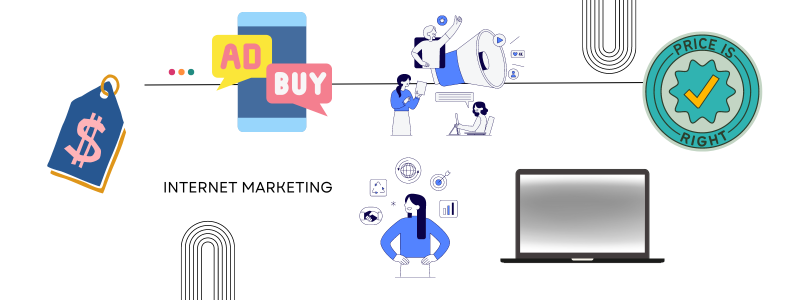
Key components of marketing include:
Market Research:
Market research leads to understanding the target market, customer preferences, and market trends through data collection and analysis.
Product Development:
It help in creating products or refining products or services to meet customer needs effectively.
Branding:
Branding developes a strong, positive perception of a company, product, or service in the customer’s mind through elements like logo, design, and messaging.
Pricing:
Setting prices that reflect the value provided and are competitive within the market.
Promotion:
Promotion is done to communicate the benefits and features of products or services to potential customers through advertising, public relations, sales promotions, and other tactics.
Distribution:
It ensures products or services are available to customers at the right place and time through various channels.
Sales:
It helps in engaging directly with customers to facilitate the purchase of products or services.
Customer Relationship Management (CRM):
Building and maintaining positive relationships with customers to encourage repeat business and loyalty.
Marketing strategies and tactics can vary considerably based on factors such as industry, target audience, and market conditions, but they all aim to connect with customers and create value for both the business and its clients.
What is internet marketing?
Internet marketing, also known as online marketing or digital marketing, is the practice of promoting products or services over the internet. It comprises of a wide range of strategies and techniques aimed at reaching a broader audience, driving traffic to websites, generating leads, and converting those leads into customers. In order to do so a service called Internet marketing services is provided.
Internet marketing services
Here are the key services of internet marketing:
Search Engine Optimization (SEO):
On-Page SEO:
Website content should be optimized, meta tags, and structure to rank higher in search engine results pages (SERPs).
Off-Page SEO:
Building backlinks from other reputable websites will improve a site’s authority and ranking.
Technical SEO:
It has to be ensured the website is technically sound, with good site speed, mobile friendliness, and proper indexing.
Content Marketing:
Blogging:
Blogging is creating and sharing valuable, relevant content to attract and engage an audience.
Videos and Infographics:
It is a process using multimedia content to convey information in a more engaging way.
E-books and Whitepapers:
This offers in-depth content to establish expertise and generate leads.
Social Media Marketing:
For this first you need a phone. Here is a phone which will serve your purpose. Samsung Galaxy S23 Ultra 5G AI Smartphone (Phantom Black, 12GB, 256GB Storage). This is the link where you can check out for yourself :- https://amzn.to/3UA6APO
Platforms:
Social media platforms like Facebook, Instagram, Twitter, LinkedIn, and TikTok should be utilize to reach and engage with target audiences.
Content:
Content is posting regular updates, promotions, and interactive content to build a following and to drive engagement.
Advertising:
It is a process of running paid campaigns to target specific demographics and increase visibility.
Email Marketing:
Newsletters:
This helps in sending regular updates and promotional content to subscribers.
Automated Campaigns:
Automated workflows is used to send personalized emails based on user behavior and preferences
List Building:
Growing a list of subscribers through lead magnets, sign-up forms, and other methods.
Pay-Per-Click (PPC) Advertising:
Search Ads:
It is a process of placing ads on search engines like Google and Bing to appear when users search for specific keywords.
Display Ads:
By using banner ads on various websites a broader audience can be reached.
Social Media Ads:

Here targeted ads are displayed on social media platforms.
Affiliate Marketing
Partnerships:
Affiliate marketing helps in collaborating with affiliates who promote your products or services in exchange for a commission on sales.
Tracking:
By using affiliate links and tracking tools to monitor performance and payouts.
Influencer Marketing:
Influencers:
By making partners with individuals who have a significant following on social media to promote your brand.
Sponsored Content:
Sponsored content refers to paying influencers to create content that features your products or services.
Conversion Rate Optimization (CRO):
A/B Testing:
This involves in testing different versions of web pages or ads to see which performs better.
User Experience (UX):
It aims at improving website design and functionality to enhance the user experience and increase conversions.
Analytics:
Tools like Google Analytics can be used to track user behavior and make data-driven decisions.
Online Public Relations (PR):
Press Releases:
Press releases help in distributing news about your business to online media outlets.
Reputation Management:
By monitoring and managing your brand’s online reputation through reviews and social media interactions.
E-commerce Marketing:
Product Listings:
By optimizing product pages for search and usability.
Shopping Ads:
Platforms like Google Shopping can be used to promote products directly in search results.
Cart Abandonment:
By implementing strategies to recover abandoned shopping carts, such as retargeting ads and email reminders.
Web Design and Development:
Responsive Design:
Responsive designs ensure that the websites are mobile-friendly and responsive.
E-commerce Solutions:
Its aims at building and optimizing online stores for better sales and customer experience.
Custom Development:
By creating custom features and functionalities to meet specific business needs.
Internet marketing is essentially required for businesses of all sizes as it provides a cost-effective way to reach a large audience, track performance in real-time, and adjust strategies based on data and feedback. It allows businesses to build brand awareness, engage with customers, and drive sales in a highly competitive online environment.
Advantages of internet marketing
Internet marketing offers various advantages for businesses of all sizes. Here are some of the key benefits:
Global Reach:
Internet marketing allows businesses to reach a global audience, breaking geographical barriers and expanding market potential.
Cost-Effective:
In compared to traditional marketing methods like TV or print advertising, internet marketing is generally more affordable and offers a higher return on investment (ROI).
Targeted Advertising:
Various businesses can use data and analytics to target specific demographics, interests, and behaviors, ensuring their marketing efforts reach the most relevant audience.
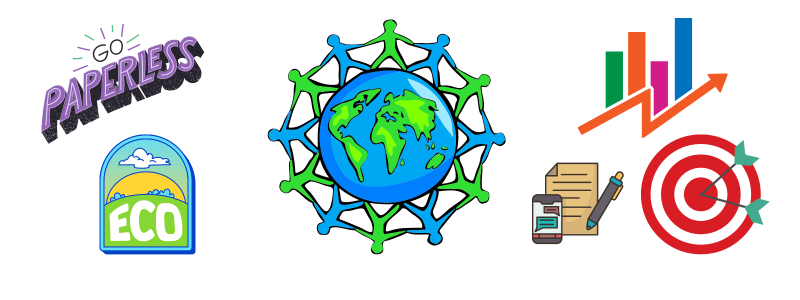
Measurable Results:
Digital marketing tools and platforms provide detailed analytics and metrics, allowing businesses to track the performance of their campaigns in real-time and adjust strategies accordingly.
Personalization:
Internet marketing enables personalized communication with customers through email campaigns, social media interactions, and targeted ads, enhancing customer experience and loyalty.
Enhanced Engagement:
Interactive content such as videos, quizzes, and social media posts can engage users more effectively, fostering stronger connections and encouraging customer interaction.
Flexibility and Agility:
Online marketing campaigns can be quickly modified or scaled up based on performance data, making it easier to adapt to market changes and consumer preferences.
Improved Conversion Rates:
With the use of techniques like A/B testing, conversion rate optimization (CRO), and retargeting, businesses can enhance the likelihood of turning website visitors into paying customers.
24/7 Marketing:
For this you need to watch out your progess. This laptop will help you do you work smoothly. Enjoy the discounts in this festive season. HP 15s Intel Core i3 12th Gen (8GB DDR4 RAM/ 512 GB NVMe M.2 SSD/Windows 11 / MS Office’2021 / FHD 15.6″ (39.6 cm) / Silver / 1.69 kg/Dual Speakers) fq5326TU / Laptop. Here is the link for your purchase:- https://amzn.to/40r5r0Q
Through internet businesses can reach and engage with potential customers at any time, without the limitations of traditional business hours.
Content Sharing and Virality:
A range of high-quality, shareable content can spread quickly across the internet, increasing brand visibility and reach without additional costs.
Building Brand Authority:
Consistently producing valuable content, engaging with customers, and maintaining an active online presence helps establish and reinforce brand authority and credibility.
Competitive Advantage:
By investing in the latest digital marketing trends and technologies, businesses can stay ahead of competitors and capture market share.
Customer Insights:
Internet marketing provides valuable data about customer preferences, behaviors, and feedback, which can inform product development, customer service improvements, and overall business strategy.
Scalability:
Digital marketing efforts can easily be scaled up or down to match business growth, budget constraints, or market demand.
Access to a Variety of Platforms
Businesses can use multiple platforms (social media, search engines, email, etc.) to reach different segments of their target audience and expanding their marketing strategies.
Competitive Advantage:
Staying Current:
By investing in the latest digital marketing trends and technologies, businesses stay ahead of competitors.
Innovative Strategies:
By this process businesses can differentiate themselves by using creative and innovative online marketing tactics.
Customer Insights and Feedback:
Data Collection:
Digital marketing tools provide insights into customer preferences, behaviors, and feedback, which can inform product development and marketing strategies.
Surveys and Polls:
Digital Businesses can gather direct feedback from customers through online surveys and polls.
Environmental Benefits:
To keep a track you need a laptop. You dont have budget but want something good to work with. Here is a laptop which will solve your problem. Acer Aspire Lite 12th Gen Intel Core i3-1215U Thin and Light Metal Laptop (Windows 11 Home/8GB RAM/512GB SSD/Intel UHD Graphics/MSO) AL15-52, 39.62cm (15.6″) Full HD Display, Steel Gray, 1.59 KG. Here is the link where you can check out for yourself :- https://amzn.to/3CcRhGv
Reduced Paper Use:
Digital marketing reduces the need for printed materials, contributing to environmental sustainability.
Conclusion
These advantages make internet marketing a powerful tool for businesses seeking to increase their visibility, engagement with their audience, and to drive growth in a cost-effective and calculated way. Overall, internet marketing is a powerful tool that enables businesses to reach a broad audience, engage customers more effectively, and achieve better results with an efficient use of available resources.



I will surely add. Thank you for giving your feedback.